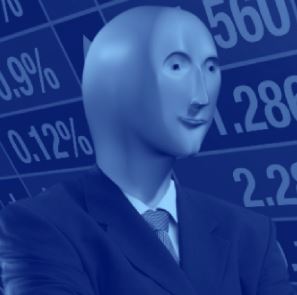Remember the roar of the crowd at a sporting event? Now imagine that same electrifying energy coursing through the veins of the financial world. That’s the essence of the meme stock phenomenon – a social media-fueled spectacle where everyday investors, armed with internet memes and online communities, challenged the status quo of Wall Street.

But this isn’t your typical David vs. Goliath story. Here, David, the underdog, wasn’t a single person, but a legion of retail investors – the average Joes and Janes with a smartphone and a brokerage account. Goliath, on the other hand, wasn’t a single entity either, but a collection of hedge funds, the big players who traditionally called the shots in the market.
The Birth of a Phenomenon: From Basement to Boom
The year was 2020. The world was grappling with a pandemic, and the stock market was a rollercoaster ride. In the midst of this uncertainty, a seemingly innocuous post on Reddit’s r/WallStreetBets forum, a haven for unconventional investors, sparked a revolution. The post, featuring a user now known as “Roaring Kitty” with a substantial holding in GameStop (GME), a struggling video game retailer, ignited a firestorm of interest.
GameStop, facing potential bankruptcy, was heavily shorted by hedge funds – a risky bet that the stock price would decline. But the Reddit community saw an opportunity. They recognized the high short interest as a potential vulnerability. By collectively buying GME shares, they could trigger a “short squeeze,” forcing hedge funds to buy back their shorted shares at inflated prices to minimize losses. This, in turn, would drive the price even higher, creating a domino effect.
The Social Media Symphony: Memes, Forums, and the Power of Community
News travels fast on the internet, especially on platforms like Reddit. Discussions exploded, fueled by witty memes and clever analysis. The narrative wasn’t just about making money; it was about challenging the established order, a fight for the little guy against the Wall Street whales.
The “diamond hands” meme became a rallying cry, urging investors to hold onto their shares even when the market became volatile. Live Streams, online chats, and coordinated buying efforts created a powerful sense of community. It wasn’t just about individual gain; it was about collective action and shared purpose.
The Market Mayhem: When Retail Investors Roared
The impact was undeniable. The price of GME skyrocketed, defying all traditional market logic. Hedge funds, caught off guard by the sheer force of the retail investor movement, scrambled to cover their short positions. News outlets were flooded with headlines, financial analysts were left scratching their heads, and the world watched in awe as the underdogs threatened to topple the giants.
The tremors of this “meme stock frenzy” weren’t limited to GameStop. Other companies, like AMC Entertainment (AMC), a movie theater chain facing similar challenges, also saw their share prices surge due to the online buzz. The established financial system, built on meticulous calculations and cold logic, was forced to acknowledge the unpredictable power of social media and online communities.
The Fallout: Lessons Learned and Questions Raised
The meme stock saga wasn’t without its consequences. The rapid rise in prices was unsustainable, and eventually, the bubble burst. Many investors who jumped on the bandwagon without proper research faced significant losses. Regulatory bodies scrambled to understand the implications of this new phenomenon and address potential market manipulation.

However, the meme stock phenomenon also served as a wake-up call. It exposed the vulnerability of heavily shorted stocks and highlighted the potential for manipulation by both retail and institutional investors. It fostered discussions about market fairness and the need for greater transparency.
Conclusion: The meme stock craze was a wild ride that shook things up in the stock market. It might be over for now, but it left a lasting mark. The big takeaway? Regular investors, with the help of online forums and social media, can now have a real say in how the market moves. This is a big change – it’s like giving everyone a voice, not just the fancy Wall Street guys. The future of these meme stocks is anyone’s guess, but one thing’s for sure: the game has changed. Financial institutions gotta pay attention to what people are saying online, and everyday investors have more power than ever before. It’ll be interesting to see how this all plays out in the future, but one thing’s certain: the world of finance is no longer the same.


